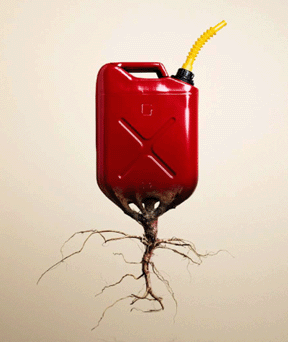These days that everyone is talking about climate change and increase in greenhouse gases, bio-fuels can be a good alternative to fossil fuels. Bio-fuels are liquid, gas or solid fuel that are produced from bio-masses such as corn, sugarcane, wheat, oil seed and so on. Production of these edible crops requires high quality agricultural lands; using them for bio-fuel production can cause food scarcity, environmental concerns (replacing forest with crop lands) and economical costs. To minimize the negative effects of bio-fuel production on human beings, scientists are hoping to use inedible super-tough plant materials known as lignocellulose instead of using humans’ food source in production of bio-fuels. However breaking down lignocellulose in switch grass, corn stalks and wood chips requires high heat, pressure and harsh acids.
Who could imagine that solution to those limitations can be found in panda’s feces. There is an enzyme produced by bacteria found in panda’s gut that is strong enough to breakdown the tough plant materials. Researcher Ashli Brown and her colleagues have collected and analyzed panda’s feces and found several digestive bacteria that are similar to those found in termites that digest wood. Pandas eat 20 to 40 pounds of bamboo, leaves and stems everyday and have the ability to break down 95% of plant cellulose into nutrition. By isolating the bacteria in the giant panda’s gut, Brown is hoping to find the most powerful digestive enzyme that can be used in production of bio-fuels in order to genetically engineer this enzyme gene into yeast for massive production.
Using the enzyme contained within the giant panda’s gut in production of bio-fuels can be clearly faster, cleaner and less costly than the traditional method used today. This also can help in reduction of hunger by avoiding burning edible food source for bio-fuel production. Another point is that “The discovery also teaches a lesson about the importance of biodiversity and preserving endangered animals,” Brown said. I believe that every living thing such as plants or animals around us could be a beneficial source of products that may save our lives, so we have to take action in saving those endangered plants and animals in order to save the beneficial resources that they provide us.
https://www.youtube.com/watch?v=flJCcyAUn24
Simin Yahyavi


